by Nivi Jaswal, VLCE & Salina Shah, VLCE
posted Dec 8, 2020
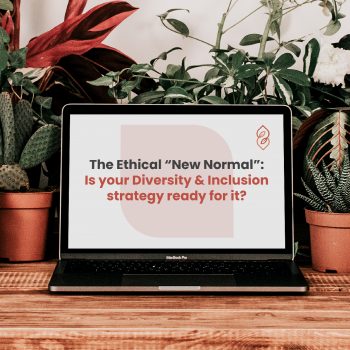
2020 has been a time for individual reflection and personal growth. Join a virtual yoga class. Learn to play the guitar. Watch new documentaries. These learnings at home will spill over into the workplace once we are post-pandemic.
So too will a growing philosophical belief.
Earlier this year, in the UK, a judge ruled that ethical veganism is a philosophical belief that qualifies for protection against employer discrimination. Nations and organizations that embrace evidence-based nutrition and veganism as a philosophical belief will future-proof themselves. Veganism is indeed part of the new normal.
Trailblazing this philosophical new normal are Millennials and Gen Zers, comprising 59% of the global workforce.
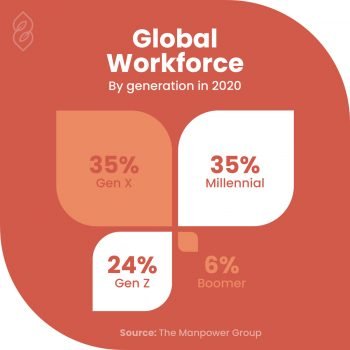
US Millennials are racially and ethnically diverse, growing up with a myriad of tastes. They are comfortable with new technology, used to collaboration, and most of all, desire a sense of purpose. Now take that demographic, put it on steroids, add climate change awareness, compassion for animals, and a strong desire for positive mental health, and you get Gen Z.
In recent years, there has been a global shift towards plant-based eating, including vegetarianism and veganism. A recent US survey suggests roughly 15% Millennials are “plant-based” all the time, with an additional 16% who are “sometimes vegetarian.”
Gen Zers are poised to surpass that. Gen Z’s championing of veganism is a phenomenon that knows no borders. Findings in the United States point to 79% of Gen Z being “eager to go meatless” a few times a week, with 60% reporting they’re ready to base their diets on more “plant-forward foods.”
Understanding and engaging with these purpose-driven, plant-powered, planet-compassionate Millennials and Gen Zers is key to the success of employers. Pivoting towards a plant-based workplace will be a cornerstone for talent attractiveness, engagement and retention.
What does this talent look like? Women, especially, women of color, as Black Americans are three times more likely to be vegan and vegetarian than white Americans.
Perhaps this talent looks like Tyler, Emma, or Kim.
Tyler, proud of her Black heritage, loves to play the cello, is interested in East Asian studies, has multicultural friends and reviews every restaurant on the HappyCow app. Vegans in their group determine where they eat.
As a school shooting survivor, Emma garnered national attention when she took the stage during a moment of silence at the March for Our Lives event. She has become a LatinX icon for societal change and youth empowerment.
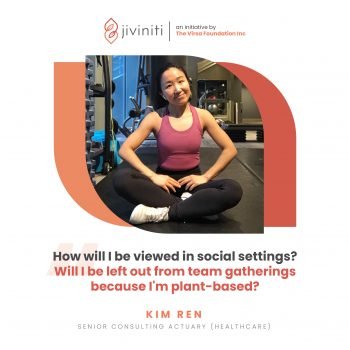
After moving from China to the US for further studies, Kim has been blazing up the corporate ranks. Earlier this year, building upon her interest in healthy living, Kim keenly watched The Game Changers on Netflix. She stopped eating meat and has been nearly vegan for the past 10 months. Making the shift while working remotely has been a relatively smooth process. However, when she returns to the office, will her plant-based diet be supported and accepted?
Corporate America is acutely aware of its lack of diversity. A lot of effort is being made to introduce new perspectives in what continues to be predominantly older, heterosexual, white male leadership. Pervasive carnism and associated masculine tropes, however, still continue to be overlooked in the workplace.
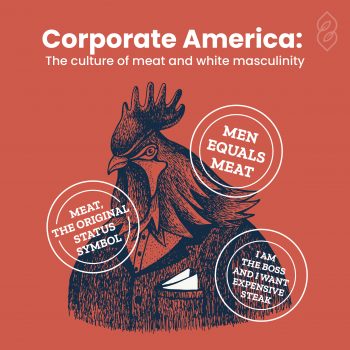
Food plays a central role in social workplace gatherings. Steak and seafood establishments are the norm for group dining on the corporate expense account. For ethical vegan professionals, these corporate social functions can range from being nutritionally challenging to ethically distressing.
Some companies are starting to remove this ethical dilemma from the corporate dining experience. Global real estate firm WeWork made headlines in 2018 when it banned meat (including red meat, poultry, and pork) both at employee events and for corporate expense reimbursement.
As the global workforce rapidly veganizes, many countries and companies will have to revisit their discrimination regulations and policies. In the US, individuals have long been protected against religious discrimination, including those “who have sincerely held religious, ethical or moral beliefs.” Similarly, the judge in the UK court case earlier this year declared that veganism “is a philosophical belief, not just an opinion.” The Vegan Society (UK) recently released a booklet, Supporting Veganism in the Workplace: A Guide for Employers. As corporate awareness of the need to include vegan-friendly practices grows, resources like these will be useful in nudging diversion and inclusion strategy to stay relevant in the new normal.
That new normal starts with a plant-forward, compassionate economy. Please check out the campaign.
In addition, please sign the petition that will go to Vice-President-Elect Harris to help her understand the role plant-based nutrition can play in a healthier, more sustainable, and more equitable world, and encourage her to try this out for 31 life-changing days.
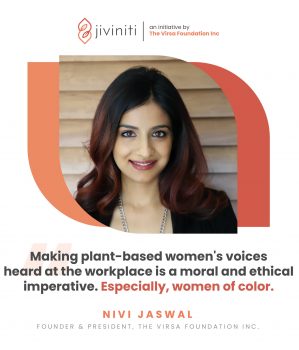
Nivi Jaswal is a graduate of the Main Street Vegan Academy and has over 15 years of international corporate experience in brand management and marketing for consumer goods (Unilever), life sciences (Boston Scientific) and the media and research industry (WPP). She has lived and worked in seven different countries and visited 47—and can’t wait to start traveling again once our world is safer! She is a Board-Certified Health and Wellness Coach, trained at the Mayo Clinic, and a Certified Lifestyle Medicine Coach (American College of Lifestyle Medicine). After personally witnessing the power of a whole foods, plant-based lifestyle in reversal of chronic illness, she started a brand strategy and business consulting and coaching practice, solely focused on vegan non- and for-profits—touching across plant-based nutrition, climate change, lifestyle choices, and sustainability.
Nivi also runs The Virsa Foundation Inc., a 501c3 nonprofit in the Boston area, focused on whole food, plant-based lifestyle research programs and intervention for underserved communities, especially women of color, in India (where Nivi is originally from) and USA (her adopted home). She is currently leading an ethnographic research program focused entirely on low income, nutritionally-underserved women of color in the US. The JIVINITI Research Program will offer key insight into behavior change under conditions of socioeconomic oppression and imminent climate refugeeism. While processed foods and beverages tend to focus on those who can pay, Nivi fervently believes that businesses with compassion embedded in their mission cannot afford to ignore those who are often “zip-coded” out of emergent health and wellness options.
Nivi has recently founded the JIVINITI Women’s Coalition, which is partnering with diverse women’s led organizations in the U.S. and globally and appealing the incoming Biden-Harris administration to pivot towards a plant-powered economy.
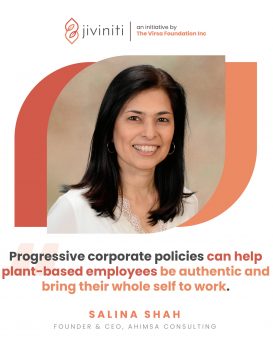
Salina Shah is a Boston-based actuary, a Senior Vice President in health consulting analytics, and a co-inventor of a health benefits optimization software patent. She has years of start-up and Fortune 500 experience leading the design, development, and delivery of innovative solutions. She has expertise in innovation strategy, operations, execution and people leadership.
Salina is also Founder and CEO of Ahimsa Consulting. Vegetarian for the past 30 years and vegan for the past five, Salina experienced firsthand the workplace challenges of maintaining a plant-based lifestyle while rising to be a corporate executive and people leader at a Fortune 500 company. After recently receiving the VLCE certification from the Main Street Vegan Academy, Salina established Ahimsa Consulting to raise employer awareness and create a vegan inclusive culture in the workplace for future plant-based professionals.
Additionally, Salina is an active vegan investor and vegan advocate. She is a founding member of the Vegan Women’s Leadership Network (VWLN), a long-time member of Vegan Leaders in Corporate Management (VLCM), and has completed the eCornell/T. Colin Campbell Plant-Based Nutrition certification. She provides support to plant-based initiatives, including the Actuaries for Sustainable Health Care (an international group dedicated to achieving long-term fiscal sustainability through the use of whole food plant-based nutrition) and is an associate producer of the upcoming film “They’re Trying to Kill Us” (a documentary that explores the hidden intersections between diet, disease, poverty, and racism).
Salina also volunteers with To Empower Women (TEW), a non-profit that provides training and skill development for remote work to underserved women. She curates spreadsheet training materials, and provides mentorship and support.

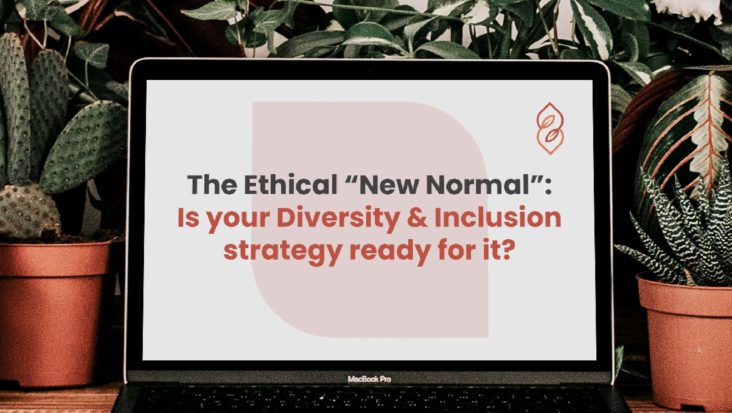
You didn’t mention people with disabilities many of whom are vegan